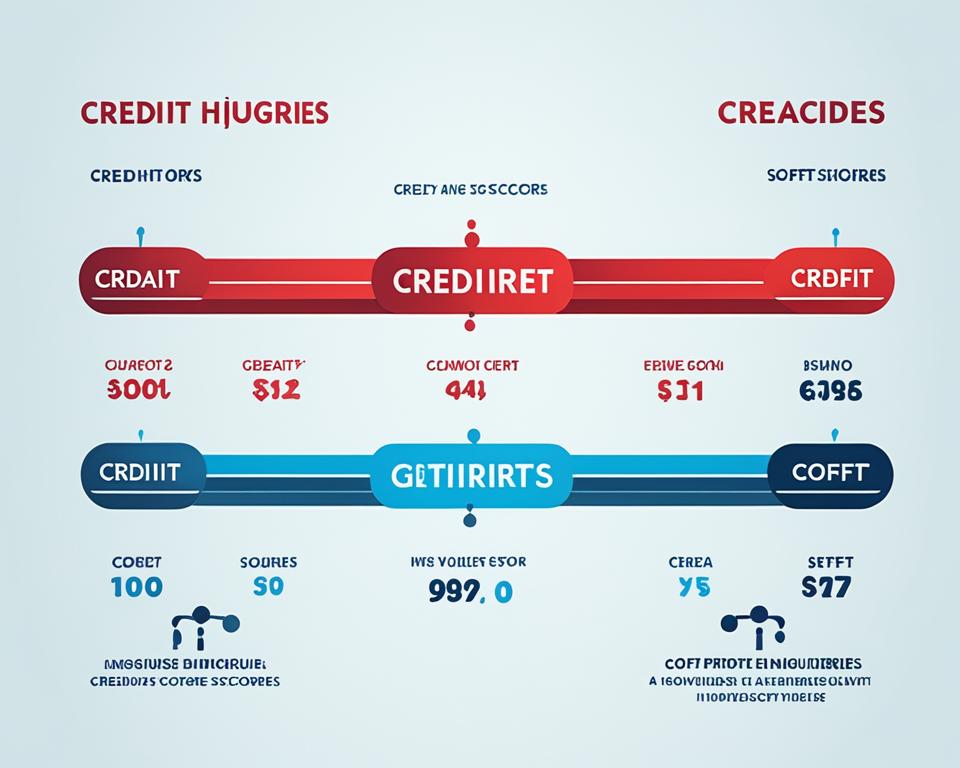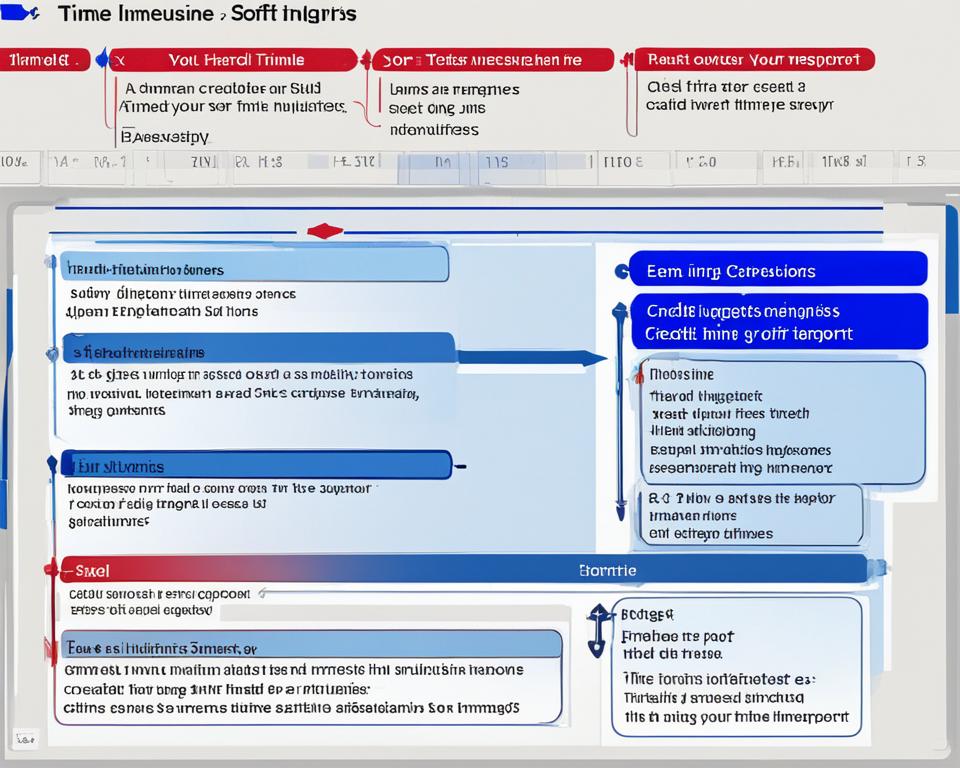Understanding the difference between hard and soft inquiries is critical for anyone aiming to maintain a robust credit score and a clear credit report. In the realm of personal finance, credit inquiries are commonplace but often misunderstood. While both types of inquiries serve as a way for lenders and others to gauge creditworthiness, their effects on a credit profile are distinct. Hard credit inquiries, or hard pulls, can affect your credit score and usually occur when you apply for a mortgage, loan, or credit card. Conversely, soft credit inquiries, like employment verifications or “prequalified” offers, do not impact your credit score. With the right information and awareness, consumers can navigate credit report inquiries and ensure their actions contribute to a healthy financial standing.
Credit inquiries explained: A clear comprehension of these terms and their implications on one’s credit score allows for informed decision-making and smart credit management. Knowing when a hard or soft inquiry might occur, one can approach their financial activities with confidence and safeguard their credit rating in turn.
Key Takeaways
- Hard inquiries may lower credit scores by a few points and typically arise during the credit application process.
- Soft inquiries won’t affect credit scores and often occur during routine background checks or for “prequalified” offers.
- Credit inquiries explained: Both hard and soft pulls are essential in assessing creditworthiness but have different implications for credit scores.
- Regular credit monitoring is essential to spot unauthorized credit report inquiries and protect against identity theft.
- Understanding the difference between hard and soft inquiries can help individuals make smarter credit-related decisions.
Unveiling the Truth: Hard vs. Soft Inquiries
Within the credit application process, understanding the difference between hard and soft inquiries is paramount for maintaining a healthy credit score. While these terms are often thrown around, grasping their exact impact on your financial health can be convoluted. Below, we unravel what these inquiries mean and how they could echo through your credit history.
Defining the Hard Inquiry
A hard inquiry is when a lender scrutinizes your credit report as part of the credit application process, determining your suitability for new credit. Common during applications for mortgages, auto loans, or new credit cards, these credit checks can slightly lower your credit score and make a lasting mark on your credit reports for roughly two years. This decrease in score is a reflection of potential new debt that has not yet been proven to be manageable by the consumer.
Understanding the Soft Inquiry
In stark contrast to hard inquiries, soft inquiries might not require your outright permission and certainly do not have the same impact on credit score. Occurring through processes like employment background checks or when you check your own credit score, soft inquiries paint a picture of your financial situation without the associated penalty of a hard pull. Their invisible footprint in terms of credit score implications makes them far less ominous from a personal finance perspective.
| Inquiry Type | Impact on Credit Score | Permission Required | Common Scenarios |
|---|---|---|---|
| Hard Inquiry | May lower score | Yes | Credit card, loan applications |
| Soft Inquiry | No effect | Not always | Background checks, personal credit checks |
To clarify, while both types of inquiries serve as tools for different entities to assess creditworthiness, their implications are fundamentally different. Credit education entails recognizing these important distinctions and approaching financial obligations and opportunities with an informed perspective.
Understanding Hard vs. Soft Inquiries
When it comes to assessing creditworthiness, two primary types of credit inquiries stand out: hard inquiries and soft inquiries. Each has its role in the financial landscape but understanding the credit inquiries explained can significantly affect a consumer’s credit report and score. Hard inquiries—also known as hard pulls—usually require your authorization and typically occur when you apply for financing through vehicles such as home mortgages, automobile loans, or credit cards.

These inquiries indicate to potential lenders that you are considering taking on new credit and can slightly decrease your credit score. However, their primary purpose is to give creditors a comprehensive view of your credit management skills before making a lending decision. On the other hand, soft inquiries—colloquially referred to as soft pulls—involve a less invasive credit check that doesn’t impact your credit score. They occur more commonly during background checks or when you inspect your own credit.
For anyone actively managing their finances or seeking new credit lines, grasping the difference between hard and soft pulls is vital. Not only do these inquiries reflect your financial behavior, but they also have varying implications for your credit health:
The difference between a hard and soft inquiry generally boils down to whether you gave the lender permission to check your credit. If you did, it may be reported as a hard inquiry. If you didn’t, it should be reported as a soft inquiry. – Credit Karma
Let’s consider these inquiries side by side to clarify their impact:
| Inquiry Type | Impact on Credit Score | Visibility on Credit Report | Authorization Needed | Examples |
|---|---|---|---|---|
| Hard Inquiry | May temporarily decrease score | Visible to lenders | Yes | Mortgage, auto loan, credit card applications |
| Soft Inquiry | No impact on score | Visible only to you | No | Credit score checks (personal), employment verification |
As highlighted in the table, hard inquiries may affect your credit score and are visible to potential lenders, reflecting a direct intent to acquire new credit. On the contrary, soft inquiries remain invisible to creditors and have no bearing on credit scores, aligning more closely with personal information reviews or pre-qualification stages.
By thoroughly understanding what each type of inquiry signifies and their potential effects, consumers can better strategize on their credit applications and credit report inquiries, aiming to maintain their financial wellbeing while pursuing new credit opportunities.
- Hard inquiries are considered during credit evaluations, potentially altering credit scores.
- Soft inquiries have no direct impact on credit scores, serving mainly informational purposes.
Even though credit inquiries form a small part of your credit report, their distinction holds a significant weight in how you are perceived by lenders. Thus, keeping a close eye on the types of inquiries on your credit report can be instrumental in optimizing your credit standing.
Decoding Credit Reports: Inquiries’ Roles
For many, credit reports remain a nebulous part of personal finances, particularly when it comes to understanding the role of inquiries. It’s well known that financial activities involving credit score checks and applications for credit can trigger inquiries, but the intricacies of these notations—how they’re made and who sees them—can significantly impact a person’s financial standing.
How Hard Inquiries Appear on Your Report
When it comes to credit monitoring, staying informed about the presence of hard inquiries is critical. These are notations in your credit reports that occur whenever a financial institution checks your credit due to a lending decision you initiated. This could happen when you apply for a credit card, a loan, or a mortgage. These hard inquiries signal potential new debt, and thus, credit scoring models take them into account when calculating your credit score.
A detailed examination of your credit report will reveal all the hard inquiries that have taken place, usually under a section labeled for credit inquiries or similar. Each listing will include the name of the entity that made the check and the date it occurred. Lenders look at these when assessing your risk level as a borrower, but it’s key to remember that these inquiries will only stay on your report for two years. Monitoring these entries can protect against unauthorized hard inquiries, which could be indicative of identity theft.
The Invisible Nature of Soft Inquiries on Credit Reports
Soft inquiries stand on the opposite side of the spectrum; they usually occur without you taking an active step toward applying for new credit. Checking your own credit score, employments screenings, or prescreened credit offers lead to these types of checks. Unlike their hard counterparts, soft inquiries won’t affect your credit score and, in many cases, they won’t even be noted on your credit reports that lenders see.
Whether they are recorded or not, soft inquiries have an ephemeral nature in the world of credit—often visible only to you, the consumer, and do not carry the weight of credit evaluation. Regular credit checks for soft inquiries can be part of a healthy financial habit, allowing you to stay on top of your financial status without impacting your credit score. It’s a form of credit score check that is concern-free but still a vital part of comprehensive credit monitoring.
Whether they make a visible mark or remain behind the scenes, understanding both hard and soft inquiries can enhance your financial literacy and enable you to navigate the realm of credit more confidently. Regular monitoring and understanding of your credit report can prepare you for credit applications, and also alert you to any potential fraudulent activity in your name. Knowing how these inquiries influence your financial opportunities is the foundation of solid credit management.
The True Influence of Hard Inquiries on Your Credit Score
When delving into the world of credit management, it’s paramount to have a solid understanding of hard inquiries and their potential impact. A crucial component for lenders in assessing creditworthiness, these inquiries can have lasting effects on an individual’s credit history and their capability to borrow in the future. Let’s shed light on the true influence that hard inquiries hold over your credit score.
The Weight of a Single Hard Inquiry
While the mention of a hard inquiry might seem daunting, the credit score effects of a single hard inquiry are generally minor. A solitary credit check of this nature may lead to a slight dip in your credit score, often by just a few points. The reason behind this marginal decrease lies in signaling potential new debt through the application of credit. Despite this slight downturn, a singular hard inquiry should not be a cause for alarm.
Consequences of Multiple Hard Inquiries
However, the narrative shifts when multiple hard inquiries cluster over a brief period. This pattern may flag to lenders a more substantial rise in credit risk, as it suggests an aggressive search for new credit lines. The subsequent result can be a more significant reduction in credit score, which can hinder credit approval processes. This truth underscores the importance of pacing your credit applications and being strategic with your financial inquiries.

Not all is lost when it comes to rate shopping for significant loans like auto or mortgage financing. Credit scoring models like FICO offer a grace period where similar loan applications within a designated timeframe are bundled into a single hard inquiry. This exception provides a buffer, allowing consumers to search for the best rate without incurring repeated dings on their credit score for each separate inquiry.
Understanding these nuances is vital, especially for those on the brink of major financial moves. Awareness of how hard inquiries influence your credit can aid in better managing your credit health, ensuring that when you step into a lender’s office, your credit score is as strong as it can be.
- Single hard inquiries might only lightly tap your credit score.
- Multiple hard inquiries in a short span can cause a more substantial drop.
- Rate shopping within certain periods groups inquiries together, mitigating their impact.
Interpreting the Credit Impact of Soft Inquiries
Unpacking the concept of soft inquiries is critical for individuals keen on maintaining their credit health. Unlike the more scrutinizing hard inquiries, soft inquiries are benign checks on your credit report that typically come from routine credit monitoring or when you initiate a credit score check. It’s a relief for many credit-conscious consumers to learn that soft inquiries have no impact on their credit scores, ensuring that one’s exploratory actions into their financial standing carry no negative repercussions.
When it comes to credit inquiries explained, it’s fundamental to recognize that soft inquiries are intended for informational use. This means that neither lenders nor credit scoring models factor these inquiries into their decision-making process. In essence, soft inquiries are stealth operations in the world of credit—they happen, they give insights, but leave no trace.
In the practice of credit monitoring, which includes checking your own credit reports and scores, soft inquiries emerge as a guilt-free tool. You can, and should, freely use services like Credit Karma to keep an eye on your credit status. This is not just advisable but recommended, as it promotes financial awareness without the anxiety of damaging your credit score.
Let’s illustrate the nature of soft inquiries with a comparative look:
| Query Type | Frequency of Use | Visible to Creditors | Impact on Credit Score |
|---|---|---|---|
| Soft Inquiries | Typically frequent | No | None |
| Hard Inquiries | Less frequent | Yes | Possible negative impact |
The data underscores the clear differential between soft and hard inquiries. While soft inquiries can be plentiful due to their non-impactful nature, hard inquiries carry more weight, warranting selective use. This highlights the protective barrier soft inquiries offer, enabling consumers to engage in periodic reviews of their financial status through routine credit score checks without the fear of a declining credit score.
In summary, knowing how soft and hard inquiries affect your credit is an empowering piece of knowledge. It enables strategic financial behaviors, breeds confidence in credit handling, and nurtures a proactive stance towards credit wellness.
Consumer Credit Checks: Hard Inquiries Under the Microscope
When initiating the credit application process, particularly for significant financial commitments like loans and mortgages, one will likely encounter hard inquiries. As such, lenders delve deeply into credit histories, seeking to understand and evaluate an applicant’s credit management skills and reliability. This thorough examination, known as a hard inquiry, can have notable credit score effects, particularly when several are conducted over a short timespan.
Yet, it’s not only large-scale loans that invite these inquiries. Credit card applications, too, necessitate such scrutiny. By grasping the critical role of hard inquiries and how they operate within the realm of consumer credit, applicants can better navigate this terrain with minimized impact on their credit standings.

Loans & Mortgages: Where Hard Inquiries are Prevalent
A hard inquiry plays a pivotal part in the loan and mortgage approval process. Prospective lenders deploy these credit checks to gauge the risk they undertake when considering offering credit. This necessary step, although at times a slight detriment to credit scores, provides comprehensive insight into an individual’s creditworthiness, factoring heavily in the ultimate lending decision.
The Necessity of Hard Inquiries in Credit Card Applications
Similar to their role in the loan approval process, hard inquiries are an integral part of evaluating credit card applications. Here, financial institutions measure potential risk, seeking assurance that the applicant can handle additional credit. While a hard inquiry may temporarily impact an individual’s credit score, being strategic about when and for what to apply can alleviate long-term effects, preserving one’s credit health.
The credit application process is a delicate dance of financial evaluations, with the hard inquiry standing as a gatekeeper to new credit opportunities. Armed with the knowledge of when these inquiries occur and how they impact one’s financial profile, consumers can engage with the process more confidently and with minimal repercussions to their credit score.
Below is a comparison of how hard inquiries impact different financial products:
| Financial Product | Impact of Hard Inquiry | Time on Credit Report | Potential Score Drop |
|---|---|---|---|
| Loan Applications | May cause a slight decrease | 2 years | 5-10 points |
| Mortgage Applications | Necessary for approval | 2 years | Varies, typically minor |
| Credit Card Applications | Essential for risk assessment | 2 years | 5-10 points, depending on credit history |
Consumers are advised to monitor their credit regularly, understand the implications of hard inquiries, and plan their applications to maintain the integrity of their credit scores. Being informed is the first step to effective credit score management.
Authorizing Credit Pulls: Hard Inquiries in Action
As part of a comprehensive fiscal strategy, understanding credit inquiries explained can have significant implications for your financial future. Taking a moment to learn about the impact of hard inquiries can help you make more informed decisions that benefit your long-term credit health.
The Requirement for Consumer Consent
When you apply for credit, whether it’s a new credit card or a personal loan, you may notice a common prerequisite – your consent for a credit check. This process, known as a hard inquiry, is not initiated without your express authorization. Hard inquiries are an essential facet of the lending world, providing creditors with the detailed information they need to make decisions on creditworthiness. As such, understanding and managing authorized credit checks is key to sustaining a robust credit portfolio.
Strategies to Manage Authorized Credit Checks
While hard inquiries are important for gaining access to various financial products, each can have a mild yet tangible impact on your credit score. The key to minimizing that influence is to approach credit applications judiciously. Staggering your credit applications over time to avoid a surge of hard inquiries can protect your credit score from unnecessary dips. Additionally, utilizing soft inquiries, through prequalification offers, conveys a snapshot of your credit potential without the influence on your credit score, making them a prudent choice for initial credit evaluation phases.
| Action | Benefit | Impact on Credit Score |
|---|---|---|
| Spreading out credit applications | Prevents multiple hard inquiries in a short period | Lower risk of significant score reduction |
| Seeking prequalification offers | Acquires credit eligibility information without hard inquiry | No direct effect |
| Monitoring credit regularly | Identifies and addresses unauthorized inquiries promptly | Helps maintain score accuracy |
By incorporating these strategies into your fiscal habits, you can maintain greater control over your credit report and its subsequent reflection of your financial health. As always, standard credit-building practices remain integral, such as ensuring timely bill payments and keeping balances low, but added attention to the frequency and authorization of credit pulls reinforces a strategic and informed approach to credit management.
When Soft Inquiries Come Into Play
Navigating the landscape of credit can often lead to questions about when and how certain types of inquiries affect one’s credit score. Particularly with soft inquiries, which play a pivotal role in personal credit management, understanding their mechanics and consequences can help consumers make informed decisions without adversely affecting their credit health.
The Harmless Nature of Checking Your Credit Score
Executing a credit score check is an intrinsic element of prudent financial monitoring. In stark contrast to hard inquiries, which can subtract points from your credit score, soft inquiries bear no risk to your financial standing. Whether you’re reviewing your credit out of curiosity or necessity, you can rest assured that this type of check will not have any negative repercussions on your overall credit score.
The Impact on Prequalification and Preapproved Offers
Understanding the seamless interaction between soft inquiries and prequalified credit card offers is essential for anyone looking to take advantage of credit opportunities. Consumers regularly receive offers from lenders declaring them ‘prequalified’ or ‘preapproved’ for credit cards and loans, making it tempting to explore what’s available. These offers are normally based on a soft inquiry, which, unlike hard ones, leaves the consumer’s credit score unscathed and their credit report untouched by any adverse marks. Thus, engaging with these promotional offers becomes a safe practice that won’t deter one’s creditworthiness.
Contrasting Credit Checks: When to Expect Each Inquiry
As you navigate through various financial landscapes, it’s imperative to have an awareness of what events might prompt a look into your credit history. Grasping the nuances of credit report inquiries, including knowing the differences between hard vs. soft checks, is essential. These inquiries often tie directly to your financial activities, particularly when you engage with major financial commitments. Let’s explore the occasions when you can expect each type of inquiry to take place.
Anticipating Hard Inquiries During Major Financial Steps
When you brace yourself for significant financial decisions, such as applying for a mortgage or financing a new car, prepare for the presence of a hard inquiry on your credit report. These hard pulls are conducted by lenders to analyze your credit in depth before they decide to extend a significant amount of credit to you. It’s a standard step within the application process for:
- Mortgage approvals, where your entire credit history is scrutinized.
- Auto loan applications, especially when seeking financing through financial institutions.
- Personal loans, which may impact your credit slightly more owing to their unsecured nature.
It’s advisable to plan these applications strategically to avoid a stack of hard inquiries, which could inadvertently affect your credit score more than necessary.
Identifying Common Scenarios for Soft Inquiries
Soft inquiries come into play in less formal contexts and do not impact your credit score. These are instances where your credit information may be reviewed, but not in connection with an application for new credit. Some of the typical scenarios for soft inquiries include:
- Checking your own credit score, something you can and should do regularly.
- Receiving “prequalified” or “preapproved” credit card offers, often emerging through routine mail.
- Background checks by prospective employers, especially in industries where financial responsibility is pertinent.
These checks are part of maintaining financial health and should not be a cause for concern as they remain essentially invisible on your credit report in the eyes of lenders.
The Duration of Inquiries on Your Credit Profile
As you shape your financial journey, it’s essential to know how long certain types of credit report inquiries affect your credit profile. Both hard and soft inquiries have a set lifespan on your credit reports, influencing lenders’ perceptions and possibly your access to credit. Awareness of these timelines empowers you to plan accordingly and mitigate any potential impact on your credit health.
The Lifespan of a Hard Inquiry on Credit Reports
Hard inquiries have a lasting presence on credit reports, enduring for up to two years. Although their influence on your credit score may diminish before the two-year mark, their visibility can affect how lenders view your credit profile. This makes understanding the credit inquiries’ duration vital for anyone actively applying for new credit lines or contemplating doing so.
How Long Soft Inquiries Linger Unnoticed
Soft inquiries also share a similar duration on your credit report, potentially appearing for as long as two years. However, their non-effect on credit scores means they often go unnoticed by creditors. These types of inquiries are benign but understanding their presence and duration can help you maintain a comprehensive picture of your credit report inquiries.

Keeping track of both hard and soft inquiry records is a proactive step towards accurate credit reporting. Regularly reviewing your credit reports will help you spot any inaccuracies or outdated information, preserving the integrity of your financial records and ensuring you’re ready for the next opportunity to utilize credit wisely.
Practical Steps to Minimize Hard Inquiry Impact
In the journey towards a robust financial health, minimizing hard inquiry effects on your credit score is a critical step. Such inquiries, while at times necessary, can temporarily dent your credit reputation. Fortunately, there are actionable strategies you can deploy to soften their impact and uphold effective credit score management. Here, we outline methods for harnessing the intricacies of the credit system to your advantage, preserving your credit standing.
A key tactic is to stagger your applications for credit. Rather than submitting multiple applications in quick succession, spacing them out responsibly can help you avoid the appearance of financial distress in the eyes of lenders. This approach reduces the number of new hard inquiries that hit your credit report in any given period, thereby protecting your score.
Another proactive measure is to utilize prequalification opportunities. Many lenders offer soft check prequalifications that give you an idea of your creditworthiness without adding a hard inquiry to your credit report. This not only safeguards your score but also informs your choices better, as you’ll have an advance insight into which credit products you’re likely to qualify for.
Understanding and using the ‘rate shopping’ window efficiently is also vital, especially when seeking loans such as mortgages or auto loans. Similar inquiries made during a concise period – typically 14 to 45 days – are treated as one when it comes to credit scoring. This period allows you to search for the best terms without accumulating multiple impacts from hard inquiries.
Below is a table illustrating the strategies and their benefits:
| Strategy | Benefit | Result on Credit Score |
|---|---|---|
| Staggering credit applications | Avoids clustering of hard inquiries | Less impact on score |
| Utilizing prequalification | Gauge potential approvals without hard inquiries | No additional hard inquiries |
| Rate shopping in set window | Multiple inquiries count as one | Minimizes perceived risk by lenders |
Employing these methods in a judicious manner ensures that while you seek new credit opportunities, you do not incur the full potential penalty to your credit score. Minimizing the impact of hard inquiries is as much about timing as it is about strategic application—it’s a testament to the adage, “good Things Come To those who Wait…for the Right time to Apply for Credit.”
Clearing Misconceptions: Soft Inquiries Explained
Amidst the myriad of credit score myths, there stands the misunderstood concept of soft inquiries and their effects—or lack thereof—on a credit profile. Distinguishing soft inquiry effects from the more impactful hard inquiries provides clarity amidst a fog of misinformation. Soft inquiries are a benign credit activity that doesn’t correlate with the potential hazards of new credit applications.
Differentiating Soft Inquiries from Credit Applications
Often, soft inquiries are conflated with the notion of credit applications, yet they serve entirely different purposes. Soft inquiries may occur for a multitude of reasons; whether it’s a periodic self-check of one’s credit score or part of a pre-employment screening, these inquiries bear no relation to the substantive act of applying for new credit. Through these harmless checks, individuals can remain vigilant over their financial standings, without triggering any credit alerts.
The Non-impactful Nature of Soft Inquiries on Credit Scores
The conversations swirling around credit scores frequently propagate the idea that all types of inquiries possess the capacity to alter credit scores. However, when it comes to soft inquiries, their influence on credit scores is non-existent. Actions such as checking your own credit history or undergoing employment verification do not tie directly to any financial liabilities or new credit terms, thus leaving your credit score untouched.
This distinction is imperative, as it underscores the importance of routinely monitoring credit without the fear of inadvertently affecting one’s scores. The proactive engagement in credit score checks remains essential to early detection of any issues and aids in fostering informed decisions concerning credit applications.
In summary, while soft inquiries are indeed a form of credit check, they should be viewed through a separate lens—one that perceives them as a non-damaging, yet critical, element of financial self-awareness and credit score management.
Navigating Credit Applications with an Informed Approach
Effective credit management is crucial when approaching credit applications. A key element in informed credit management is comprehending the roles of hard and soft inquiries on one’s credit score. By understanding these impacts, individuals can effectively navigate credit applications. A wise approach includes a strategic plan to minimize the number of hard inquiries, which can affect your credit score, while taking advantage of soft inquiries for preliminary assessments of credit options. Armed with this knowledge, consumers can make informed decisions that contribute positively to their credit histories.
Tips for Effective Credit Inquiry Management
To navigate credit applications effectively, it’s essential to be aware of how each credit inquiry can shape your financial reputation. First, limit the frequency of hard inquiries as these can imply potential risk to lenders. Instead, leverage soft inquiries for prequalification purposes—which offer insight into your creditworthiness without impacting your credit score. Regularly examining your credit reports also ensures the information is current and correct, helps identify any unauthorized inquiries, and underpins informed credit management practices.
When navigating credit applications, timing is everything. Engage in rate shopping for major loans within a focused time window to consolidate multiple inquiries into a singular event in the eyes of credit score models. This meticulous planning within the realm of navigating credit applications not only guards against unnecessary dips in your credit score but also displays to potential lenders that you’re exercising financial prudence. In the end, informed credit management means taking proactive steps to guard your credit score while seeking the best financial products for your needs.
FAQ
What is the difference between a hard and a soft inquiry?
A hard inquiry, or hard pull, occurs when a financial institution checks your credit for a lending decision, like for a mortgage, auto loan, or credit card application, and may lower your credit score by a few points. A soft inquiry, or soft pull, happens for checks like employment verification or prequalified offers and doesn’t affect your credit score.
How does a hard inquiry impact my credit score?
Each hard inquiry can slightly lower your credit score by a few points. Multiple hard inquiries over a short period can be more damaging as they may signal increased credit risk to lenders. However, if done within a rate-shopping window for certain types of loans, they are treated as a single inquiry to minimize the impact.
Can checking my own credit score lead to a hard inquiry?
No, checking your own credit score results in a soft inquiry, which does not affect your credit score. You can check your credit score frequently without worry.
Will prequalified or preapproved credit offers affect my credit score?
No, prequalified or preapproved credit offers usually involve soft inquiries, which do not impact your credit score and are not visible to creditors.
How long do hard inquiries stay on my credit report?
Hard inquiries remain on your credit reports for two years. However, their effect on your credit score usually diminishes before the two-year period ends.
Do soft inquiries show up on my credit report?
Soft inquiries may show up on your personal credit reports, but they are not visible to creditors and do not affect your credit score.
Is it necessary to authorize a hard inquiry?
Yes, hard inquiries require your explicit authorization, typically during a formal application for credit or a loan.
How can I minimize the effects of hard inquiries on my credit score?
Minimizing the effects of hard inquiries can be achieved by strategically spacing out your credit applications, using prequalification offers that involve soft inquiries, and understanding the rate-shopping window for certain loans.
How do hard inquiries work in the context of loans and mortgages?
When applying for loans and mortgages, lenders perform hard inquiries to assess your creditworthiness and risk level before approving the credit. These inquiries can slightly affect your credit score.
What are some common scenarios where a soft inquiry might occur?
Common scenarios for soft inquiries include when you check your own credit score, when you’re being considered for prequalified or preapproved credit card offers, or during an employment background check.
How can I effectively manage hard inquiries?
To manage hard inquiries effectively, be selective about authorizing credit checks, apply for new credit sparingly, and take advantage of rate-shopping windows when they are available.
What is the misconception regarding the impact of soft inquiries on credit scores?
A common misconception is that soft inquiries can affect your credit score like hard inquiries do. However, soft inquiries do not have any impact on your credit scores.
How can I navigate credit applications with an informed approach?
You can navigate credit applications with an informed approach by understanding the difference between hard and soft inquiries, planning your credit applications to avoid excessive hard pulls, and staying on top of your credit report for any unauthorized or inaccurate inquiries.





